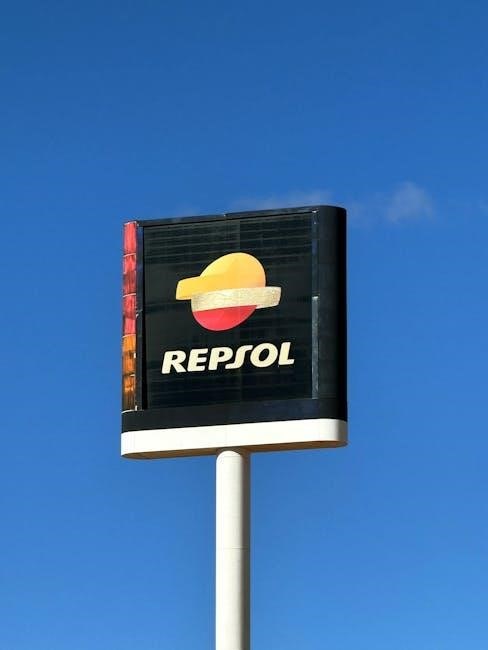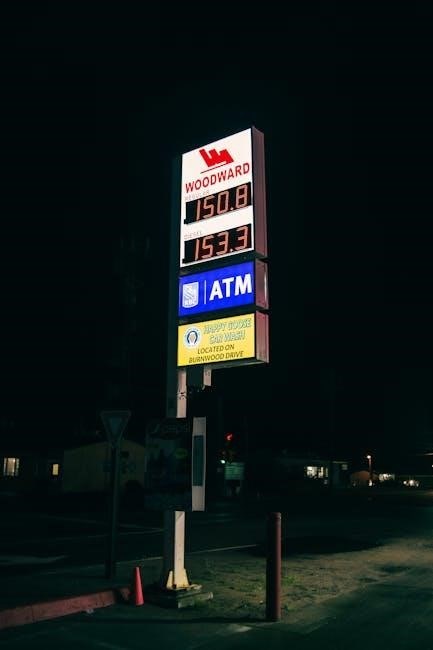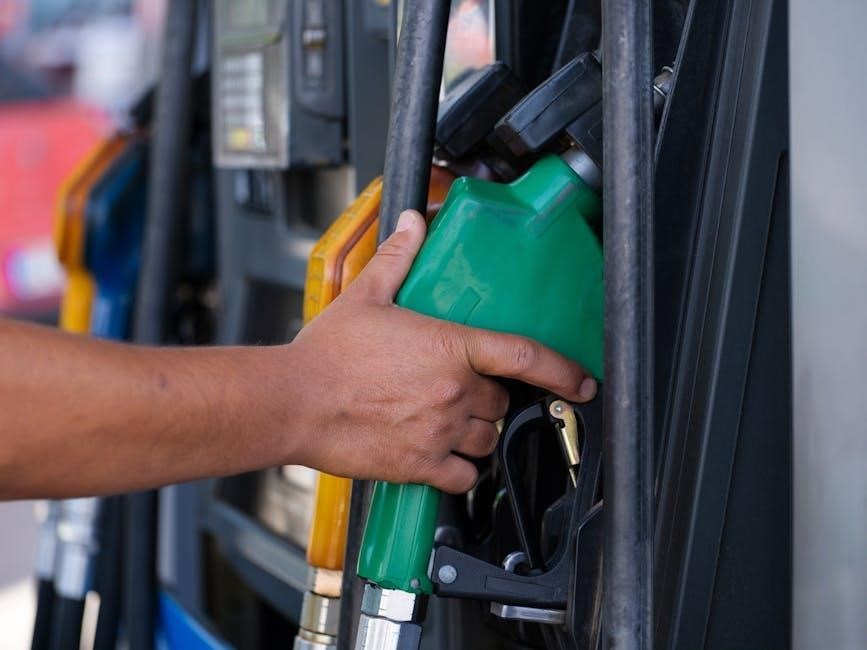international fuel gas code pdf free download
- Published
- in PDF
The International Fuel Gas Code (IFGC) is a comprehensive document ensuring safe design, installation, and operation of fuel gas systems. It provides uniform regulations for fuel gas safety, addressing storage, handling, and use of fuel gases. The IFGC is widely adopted across jurisdictions to protect people, property, and the environment. It is regularly updated to incorporate new technologies and safety standards, making it a critical resource for professionals in the gas industry. The IFGC is available for free download as a PDF, ensuring accessibility for all stakeholders.
Overview of the IFGC
The International Fuel Gas Code (IFGC) is a model code that establishes minimum safety standards for the design, installation, and operation of fuel gas systems. It addresses gas piping, appliances, and equipment, ensuring compliance with safety protocols to protect life, health, and property. The IFGC is adopted by jurisdictions worldwide and is regularly updated to reflect advancements in technology and industry practices. Its provisions are enforceable by law, making it a critical reference for engineers, contractors, and regulators. The code is accessible as a free PDF download, promoting widespread adoption and adherence.
Importance of the IFGC in Ensuring Safety
The IFGC plays a critical role in safeguarding public health and safety by establishing standardized requirements for fuel gas systems. Its provisions prevent hazards such as gas leaks, explosions, and fires by ensuring proper installation, maintenance, and operation of gas systems. Compliance with the IFGC minimizes risks to people, property, and the environment. By adhering to its guidelines, the code ensures that fuel gas systems operate safely and efficiently, protecting communities from potential dangers associated with gas usage.
Scope and Application of the Code
The IFGC applies to the design, installation, and operation of fuel gas systems, including gas piping, appliances, and equipment. It covers fuel gas systems in residential, commercial, and industrial settings, ensuring compliance with safety standards. The code also addresses storage, transportation, and use of fuel gases, providing specific requirements for various systems. Its scope extends to gas-fired appliances, venting systems, and combustion air provisions, ensuring safe and efficient operation. The IFGC is widely adopted across jurisdictions, making it a universal standard for fuel gas safety.

Key Features of the International Fuel Gas Code
The IFGC provides comprehensive safety standards for fuel gas systems, ensuring uniform regulations across jurisdictions. It covers gas piping, appliances, and venting systems, promoting safe installations.
2021 Updates and Revisions
The 2021 edition of the IFGC introduced significant updates to enhance safety and clarity. Key revisions included expanded definitions for combustible and noncombustible materials, addressing previous ambiguities. New provisions were added for gas appliance installations, ensuring stricter compliance with safety standards. Additionally, the code now incorporates updated references to international standards, reflecting advancements in fuel gas technologies. These revisions aim to streamline compliance and improve the overall safety of fuel gas systems, making the 2021 IFGC a vital resource for the industry.
Scope of Coverage: Fuel Gas Systems and Appliances
The IFGC comprehensively covers fuel gas systems, including design, installation, and operation. It addresses gas piping, appliances, and venting systems, ensuring safety and efficiency. The code applies to various fuel gases, such as natural and propane, and regulates appliances like furnaces and water heaters. It also includes requirements for connectors, valves, and combustion air systems. This broad scope ensures that all components of fuel gas systems are safely integrated, protecting users and the environment from potential hazards.
Organization and Structure of the Code
The IFGC is structured to ensure clarity and accessibility, with chapters covering specific aspects of fuel gas systems. It includes detailed requirements for design, installation, and maintenance, along with appendices for supplementary information. The code uses clear language and standardized terminology to facilitate understanding. Tables, figures, and references are provided to support compliance. This organized approach helps users navigate regulations efficiently, ensuring safe and consistent application of fuel gas standards across various industries and jurisdictions.

Safety Standards and Requirements
The IFGC establishes strict safety standards for fuel gas systems, covering design, installation, and maintenance. It ensures compliance with material specifications, venting, and combustion air requirements to minimize risks and protect property and the environment.
Storage and Handling of Fuel Gases
The IFGC provides detailed guidelines for the safe storage and handling of fuel gases, ensuring compliance with material specifications and safety standards. It outlines requirements for the location of storage containers, ventilation, and protection from ignition sources. The code emphasizes the importance of proper labeling, secure anchoring, and compatibility of materials to prevent contamination or leaks. Safety devices, such as pressure regulators and emergency shut-offs, are mandated to ensure safe operations. Regular inspections and training are also recommended to maintain compliance and mitigate risks associated with fuel gas storage and handling.
Installation Requirements for Gas Systems
The IFGC establishes detailed installation requirements for gas systems, focusing on safety and efficiency. It covers materials, connectors, and venting, ensuring proper sizing and techniques to prevent leaks. Compliance is verified through inspections, crucial for public safety. The code is essential for installers and inspectors, available as a free PDF download for easy access to detailed installation standards and ensuring system integrity.
Venting and Combustion Air Requirements
The IFGC outlines specific venting and combustion air requirements to ensure safe operation of fuel gas systems. Proper venting prevents hazardous gas buildup, while combustion air ensures efficient fuel burning. The code provides guidelines for duct sizing, termination points, and system testing. Compliance with these standards is critical to prevent risks like carbon monoxide accumulation or explosion hazards. The IFGC 2021 updates include enhanced venting provisions for modern appliances, reflecting advancements in safety and technology. These requirements are essential for maintaining a safe environment in residential and commercial settings.

Compliance and Enforcement
The IFGC is enforced by regulatory bodies to ensure adherence to safety standards, protecting public safety and property. Compliance is mandatory for legal operation of fuel gas systems.
Regulatory Bodies and Their Roles
Regulatory bodies, such as local building departments and fire safety agencies, enforce the IFGC to ensure compliance with safety standards. They conduct inspections, certify installations, and penalize non-compliance. These bodies play a crucial role in interpreting and implementing the code, ensuring public safety and property protection. They also oversee updates and training programs to keep stakeholders informed about the latest requirements and technologies in fuel gas safety.
Inspection and Certification Processes
Inspectors ensure compliance with IFGC standards, verifying proper installation of fuel gas systems and appliances. Certification confirms adherence to safety codes, while non-compliance may require corrections. Authorities conduct rigorous checks, ensuring all systems meet IFGC criteria before approval. This process guarantees public safety and environmental protection, maintaining trust in fuel gas installations. Regular inspections and certifications are essential for maintaining compliance and preventing hazards.
Penalties for Non-Compliance
Violations of the IFGC can result in significant penalties, including fines, legal actions, and mandatory corrections. Non-compliance may lead to system shutdowns or revocation of certifications. Authorities enforce penalties to ensure public safety and environmental protection. Failure to adhere to the code can also result in financial losses and reputational damage. Compliance is crucial to avoid these consequences and maintain operational integrity.

Benefits of the IFGC
The IFGC enhances safety, ensures uniformity in fuel gas regulations, and protects property and the environment. It also serves as a free, accessible resource for industry professionals globally.
Enhanced Safety for Fuel Gas Systems
The IFGC prioritizes safety by establishing strict guidelines for the installation, maintenance, and operation of fuel gas systems. It mandates regular inspections, proper venting, and combustion air requirements to prevent hazards. The code addresses potential risks such as gas leaks, explosions, and carbon monoxide poisoning, ensuring a safer environment for both commercial and residential settings. By adhering to the IFGC, professionals can significantly reduce accidents and ensure compliance with industry standards. These measures collectively enhance the overall safety of fuel gas systems.
Uniformity in Regulations Across Jurisdictions
The IFGC ensures consistency in fuel gas regulations across different regions, eliminating confusion and variability. By providing a standardized framework, it simplifies compliance for businesses operating in multiple jurisdictions. This uniformity fosters a level playing field, reducing administrative burdens and costs. The code’s widespread adoption enables seamless implementation of safety practices, ensuring that fuel gas systems meet the same high standards regardless of location. This consistency is crucial for maintaining public safety and facilitating efficient operations across diverse areas.
Protection of Property and Environment
The IFGC plays a vital role in safeguarding property and the environment by establishing strict safety protocols for fuel gas systems. Its comprehensive requirements ensure the safe storage, handling, and use of fuel gases, reducing the risk of leaks, fires, and environmental contamination. By adhering to the code, potential hazards are mitigated, protecting both residential and commercial properties from damage. Additionally, the IFGC promotes environmentally responsible practices, ensuring that fuel gas operations do not harm ecosystems or public health. This focus on safety and sustainability underscores the code’s importance in preserving our surroundings.

How to Obtain the International Fuel Gas Code
The IFGC is accessible through official sources, including free PDF downloads from recognized websites and purchase options for hard copies, ensuring widespread availability for all stakeholders.

Official Sources for the IFGC
The International Fuel Gas Code is available through the International Code Council (ICC) website, the primary authoritative source. Additionally, it can be accessed via government and industry portals that host building codes. Some libraries and professional organizations also provide access to the IFGC, either in digital or print formats. Ensuring the source is official guarantees compliance with the latest standards and regulations, which is crucial for legal and safety purposes in fuel gas systems.
Free Download Options for the IFGC PDF
The IFGC is available for free download as a PDF through the International Code Council (ICC) website, ensuring easy access for professionals and the public. Additionally, platforms like code repositories and official government websites often provide free access to the document. Some libraries and educational institutions also offer free downloads for reference purposes. Always verify the source to ensure the PDF is up-to-date and compliant with the latest safety standards and regulations for fuel gas systems.
Purchase Options for Hard Copies
Hard copies of the IFGC can be purchased directly from the International Code Council (ICC) website or through authorized retailers like Amazon and Barnes & Noble. Additionally, technical bookstores and professional associations may carry the codebook. Prices vary depending on the edition and retailer. Purchasing a hard copy ensures a physical reference for professionals needing to comply with fuel gas safety standards. Always verify the edition year to ensure compliance with current regulations. This option is ideal for those who prefer a tangible resource for frequent use.

Common Violations and Penalties

Common violations include improper installation of gas systems, inadequate venting, and non-compliance with safety standards. Penalties range from fines to legal actions, emphasizing the importance of adherence to the IFGC to ensure safety and avoid enforcement consequences.
Most Common Violations of the IFGC
The most common violations of the IFGC include improper installation of gas systems, inadequate venting, and failure to comply with safety standards. These violations often result from insufficient training or disregard for code requirements. Improperly installed gas lines can lead to leaks, while poor venting systems may cause hazardous gas buildup. Non-compliance with combustion air requirements is another frequent issue, posing significant risks to safety. Regular inspections and adherence to IFGC guidelines are essential to mitigate these risks and ensure safe fuel gas operations across all applications.
Consequences of Non-Compliance
Non-compliance with the IFGC can lead to severe legal penalties, including fines and shutdowns. It also poses significant safety risks, such as gas leaks, explosions, and fires, endangering lives and property. Financial losses from property damage and liability claims can be substantial. Additionally, non-compliance may result in environmental harm due to improper gas handling. Regulatory bodies enforce these codes strictly, and violations can damage a company’s reputation. Adhering to IFGC standards is crucial to avoid these consequences and ensure safe, lawful, and environmentally responsible fuel gas operations.
How to Avoid Violations
To avoid IFGC violations, stay informed about code updates and ensure all installations meet current standards. Conduct regular inspections and maintenance of gas systems to identify and repair issues promptly. Proper training for personnel handling fuel gases is essential. Always follow manufacturer guidelines for equipment installation and operation. Consulting certified professionals and referencing the IFGC PDF can provide clarity on compliance requirements. Proactive measures and adherence to safety protocols will help prevent violations and ensure safe fuel gas operations. Regular audits and compliance checks are also recommended.

Future Trends in Fuel Gas Safety
Emerging technologies and updates to the IFGC will drive safer fuel gas systems, focusing on efficiency, sustainability, and innovative safety measures to meet future challenges.
Emerging Technologies in Fuel Gas Systems
Advancements in fuel gas systems include smart meters, IoT-enabled monitoring, and automated shut-off valves. These technologies enhance safety by detecting leaks and monitoring usage in real-time. Renewable gas integration, such as hydrogen blending, is also gaining traction. The IFGC is expected to adopt these innovations, ensuring regulations align with technological progress. These developments not only improve safety but also support environmental goals. As the industry evolves, the IFGC will play a key role in standardizing these emerging technologies for widespread adoption.
Expected Updates in Future Editions
Future editions of the IFGC are anticipated to include updates addressing hydrogen fuel integration, enhanced leak detection protocols, and advanced safety measures for IoT-enabled gas systems. There may also be revisions to accommodate emerging technologies like smart gas meters and automated monitoring systems. These updates aim to align the code with industry advancements while maintaining stringent safety standards. Additionally, updates may focus on clarifying definitions and streamlining compliance processes to reduce interpretation challenges. The IFGC will continue to evolve to address new risks and technologies, ensuring it remains a cornerstone of fuel gas safety.
Role of the IFGC in Adopting New Technologies
The IFGC plays a pivotal role in adopting new technologies by incorporating updates that address emerging innovations in fuel gas systems. It ensures that advancements like hydrogen fuel integration, smart gas meters, and IoT-enabled monitoring systems align with safety standards. The code’s regular revisions facilitate the adoption of cutting-edge technologies while maintaining public safety. This proactive approach allows the IFGC to stay relevant and guide the industry in implementing innovative solutions safely and efficiently.
The IFGC is a vital resource for ensuring safety, uniformity, and environmental protection in fuel gas systems. Its updates and availability as a free PDF promote widespread adoption and compliance.
The International Fuel Gas Code (IFGC) is a critical document for ensuring the safe installation, operation, and maintenance of fuel gas systems. It provides uniform standards across jurisdictions, reducing risks to people, property, and the environment. Regular updates incorporate new technologies and safety practices. The IFGC is widely adopted and its availability as a free PDF ensures accessibility for professionals and stakeholders. Compliance with the code is essential for legal and safety reasons, making it a cornerstone of the fuel gas industry.
Final Thoughts on the Importance of the IFGC
The International Fuel Gas Code (IFGC) is a cornerstone for ensuring safety, compliance, and environmental protection in the fuel gas industry. Its uniform standards and regular updates make it indispensable for professionals, regulators, and stakeholders. By adhering to the IFGC, risks associated with fuel gas systems are minimized, protecting people, property, and the environment. The free availability of the IFGC as a PDF enhances accessibility, fostering widespread adoption and compliance. It remains a vital resource, adapting to emerging technologies and continuing to set the standard for fuel gas safety and best practices.
Resources for Further Reading
The official IFGC website offers comprehensive resources, including the latest editions and guides. The International Fuel Gas Code PDF can be downloaded for free from official sources.
Official IFGC Website and Publications
The official IFGC website provides access to the latest editions of the code, including the 2021 IFGC. Users can download the International Fuel Gas Code PDF for free, ensuring compliance with safety standards. The website also offers supplementary materials, such as interpretation bulletins and training resources, to aid in understanding and implementation. Additionally, the International Code Council (ICC) publishes updates and revisions, making it a reliable source for professionals seeking accurate and authoritative information.
Additional Resources and References
Beyond the official IFGC website, numerous online platforms offer detailed resources and references. The International Code Council (ICC) website provides access to the IFGC PDF and supplementary materials. Additionally, websites like ICCsafe.org and nfpa.org offer related codes and standards. Online libraries and academic databases also host publications on fuel gas safety. For enthusiasts, forums and professional groups share insights and updates on the IFGC. These resources ensure comprehensive understanding and compliance with the code, supporting professionals in the fuel gas industry.
